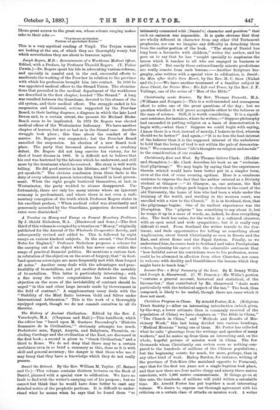Joseph Rogers, M.D. : Reminiscences of a Workhouse Medical Officer.
Edited, with a Preface, by Professor Thorold Rogers. (T. Fisher Unwin.)—Dr. Rogers spent his life in advocating various reforms, and specially in manful and, in the end, successful efforts to ameliorate the working of the Poor-law in relation to the province with which his profession brought him into contact. In 1856 he was appointed medical officer to the Strand Union. The abomina- tions that prevailed in the medical department of the workhouse are described in the first chapter, headed "The Strand." A long war resulted between the Guardians, devoted to the abuses of the old system, and their medical officer. The struggle ended in his suspension and dismissal, actions supported by the Poor-law Board, to their lasting disgrace, a disgrace in which the late Lord Devon and, to a certain extent, the present Sir Michael Hicks- Beach seem to be implicated. In 1872 Dr. Rogers was elected medical officer of the Westminster Infirmary. We have another chapter of horrors, but not so bad as in the Strand case. Another struggle took place ; this time about the conduct of the master. Dr. Rogers was suspended ; but the Poor-law Board annulled the suspension. An election of a new Board took place. The party that favoured abuses received a crushing defeat. Dr. Rogers did not long survive his victory, for he died of heart disease in 1886. It is difficult not to believe that his end was hastened by the labours which he underwent, and still more by the treatment which he received. His story is well worth telling. He did good service in his lifetime, and " being dead he yet speaketh." The obvious conclusion from these facts is the duty of every educated person interesting himself in local govern- ment. When the right people bestirred themselves, at last, in Westminster, the party wedded to abuses disappeared. Un- fortunately, there are only too many unions where an ignorant economy is predominant, and where there is not even a rudi- mentary conception of the truth which Professor Rogers states in his excellent preface, "When medical relief was abundantly and generously accorded by the Guardians, pauperism decreased and rates were diminished."






































 Previous page
Previous page